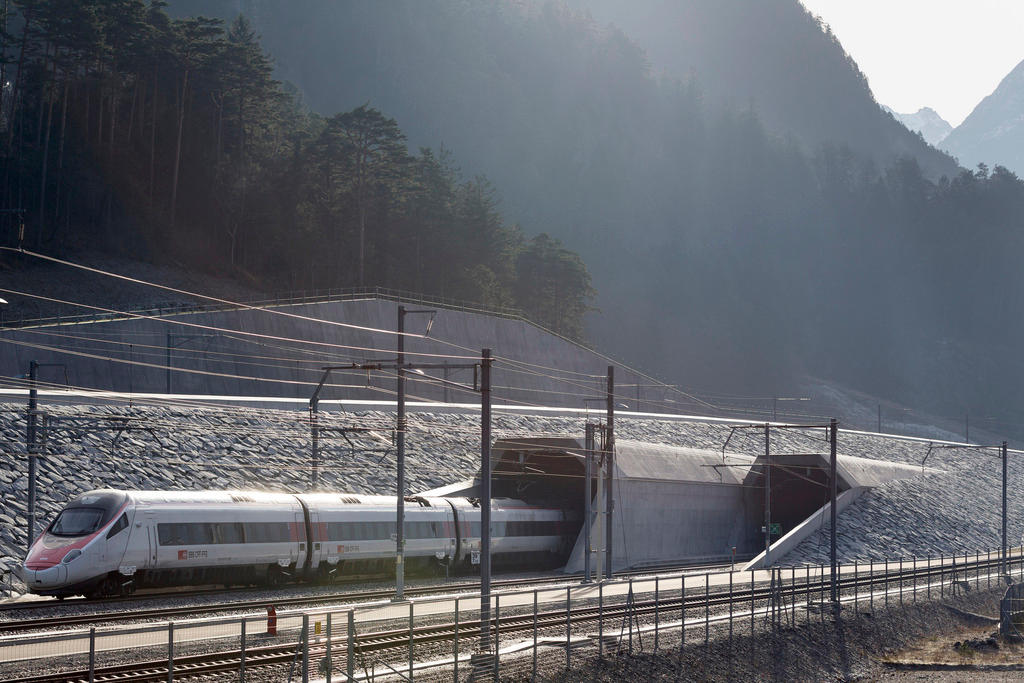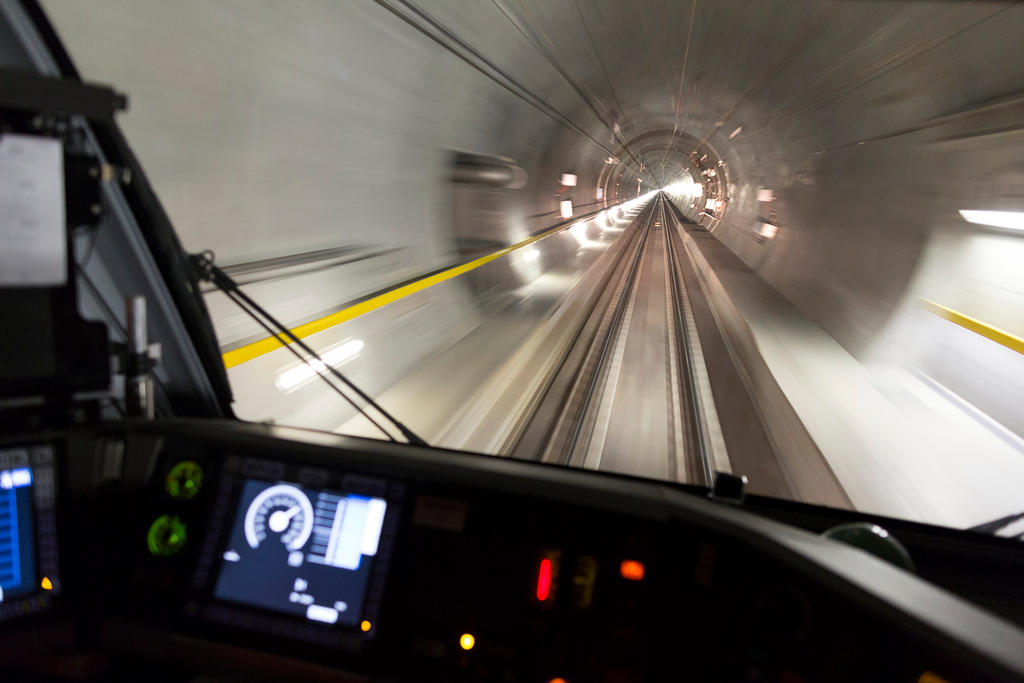‘Chinese trains could one day travel through the Gotthard’

Chinese trains are on track to be a major force in the European market, says Cui Jun, a Swiss-based railway expert and consultant. She tells swissinfo.ch about cultural differences, accusations that China stole Swiss technology, and why Chinese high-speed trains will never be sold to Switzerland.
swissinfo.ch: As a railway consultant, which projects have you worked on which involved collaboration between Switzerland and China?
Cui Jun: Aside from the collaboration with ABB, there are currently few large-scale projects in the rail sector. In 2012, I was asked to lead the official Swiss railways industry delegation, which was made up of nine companies and which formally toured the Chinese rail industry for the first time.
swissinfo.ch: What are the major challenges that one encounters?
C.J.: The biggest difficulties that the Swiss encounter when they want to develop their businesses in China are the language barrier and cultural differences. Because of a lack of intermediaries, collaboration and discussion between the Swiss and the Chinese is almost impossible. The cultural differences, as well as an imperfect understanding of what is appropriate, have the effect that often one side doesn’t know clearly when to persist or when to yield. So it is impossible to avoid misunderstandings and certain cases even end in the venture failing.
Cui Jun
Cui Jun graduated from Central South University in China (former Changsha Railway University) in 1981.
She has over 35 years of experience with CRRC (1985-1996), Siemens (1996-2005) and Switzerland Global Enterprise in the Swiss official export system (2006-2011). She is currently an independent business consultant, advising and guiding Swiss exporters to develop business in the Chinese railway market.
During her ten years as a railway expert (2007-2017), she has worked with various Swiss railway firms including ABB, SBB, Duagon, Ruf Telematik, Systransis and Plumettaz.
When the seriousness and the tenacity of the Swiss meet the discretion and the reserve of the Chinese, discussions often meet an impasse. That is why resolving misinterpretations and encouraging mutual understanding is such an important part of my work.
swissinfo.ch: The Chinese are keen to see their trains enter the European market, but have they achieved the same quality of those manufactured in Europe or the United States?
C.J.: Yes. When it comes to costings and advanced management methods, the Chinese are still lagging behind developed European countries. But from the point of view of technological manufacturing and of the quality of the product, they have already reached international standards.
In the largest businesses, the experience surpasses even that of European countries. Last year, the revenue of the Chinese rail vehicle industry on the international market reached $90 billion (CHF87 billion). Freight wagons were exported to France and Britain, and branch offices were established in Britain and Austria.
Even though there is a long way to go, carving out a piece of the European market is only a question of time for the Chinese rail industry. To underestimate Chinese rail would not be forward-thinking.
swissinfo.ch: How do the differences in political regimes affect the handling and execution of business deals between the two countries?
C.J.: In Switzerland, the government rarely intervenes because economic power belongs in large part to the private sector. Swiss railways are more centred on the needs of the people: they pay much more attention to the quality and security. In addition, thanks to its innovative technology and liberal environment, Switzerland attracts high-tech talent from all over the world.
For its part, China insists on the primacy of the collective interest over the individual interest, and the growth of gross domestic product (GDP) outweighs everything else. The Chinese rail market is, to a large extent, still limited to a few national companies that exercise enormous power with no competition.
These differences in the political regimes of Switzerland and China lead to major discrepancies. Unquestionably, Chinese national companies want to work with large businesses with international reputations, while the small or medium-sized Swiss companies have difficulty making headway in the Chinese market. The establishment of contracts and partnerships in the rail sector is subject to all these difficulties.
swissinfo.ch: China claims it developed its high-speed train technology itself, but some say that the Chinese stole the technology from the Swiss. What is your opinion?
C.J.: It’s not theft, but more an exchange of technology. In fact, after its reform and opening up, China adopted a strategy of technological exchange through the market. Certain Swiss technological products were exported to China by the big industrial groups like Siemens, ABB, etc.
In a globalised economy, it is not appropriate, whatever the sector, to try to entirely adopt one country’s technology from A to Z; a carpenter does not need to learn how to plant trees. But once the technology of high-speed trains is introduced, it is crucial to be able to assimilate it. From this point of view, Chinese railways are a success. The pivotal development of Chinese rail rests in its constant technological improvement, the increase in production rates and maintaining competitiveness in terms of quality/price at an international level.
swissinfo.ch: The high-speed trains are often considered a Chinese government propaganda tool. What is the reality?
C.J.: Two Chinese state-owned companies are among the largest manufacturers and distributors of rail vehicles in the world. The Chinese government accords them the highest priority to push the export of high-speed trains, with the intention of using them as a national calling card. This aggressive method of putting national finances into play inevitably provokes the antipathy of Western developed countries.
Chinese rail needs to clearly understand that if it wants to conquer the international market, it is not enough to measure oneself in terms of size, but it is also necessary to observe the laws of the international market and to pay attention to the international regulations in place.
Chinese national businesses are also in need of profound reform otherwise it will be very difficult for them to increase their efficiency and the standards of their management and organisation. What we can say with certainty is that Chinese high-speed trains will not be sold to a country like Switzerland.
swissinfo.ch: Why?
C.J.: The geographical size of Switzerland is the equivalent of a Chinese province. To travel by train (at a speed of 200km/h) from Geneva to Zurich takes three hours at most, so it is not essential to build a rail line for speeds that pass 250km/h.
swissinfo.ch: How do you see the development of bilateral relations between Switzerland and China? Will Chinese-made trains travel through the Gotthard tunnel one day?
C.J.: Chinese railways play an important role on the international scene. From a technical and quality point of view, the manufacturing process does not differ greatly from European processes. I would not be at all surprised if Chinese trains travelled through the Gotthard tunnel one day. The Swiss rail industry is already aware that China is a considerable market, both in terms of sales and acquisition of rolling stock. The probability that a future partnership will develop between the two countries in the locomotive sector is very high.
(Translated from French)

In compliance with the JTI standards
More: SWI swissinfo.ch certified by the Journalism Trust Initiative





You can find an overview of ongoing debates with our journalists here. Please join us!
If you want to start a conversation about a topic raised in this article or want to report factual errors, email us at english@swissinfo.ch.